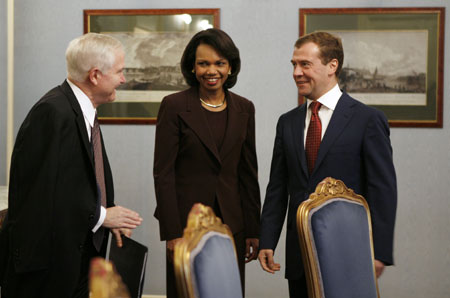The Kremlin proposed to share one of its radar stations in Azerbaijan last year, a suggestion given little attention by the White House.
The first round of the 2-plus-2 talks, between both nations' foreign and defense ministers, held in Moscow last October also failed to reach agreements on the shield that has soured bilateral ties since it was tabled last year.
Analysts believe that Moscow is waiting for a shift of ideas or at least a change of manner when the next US administration takes office next year, but the two sides have pledged to continue negotiations.
"The problem is how to select and to separate the real problems from the imaginary problems and how to work on these real problems," said Viktor Kremenyuk, an expert with the Institute of the USA and Canada of the Russian Academy of Science.
"Both sides simply have no other choice but to make a breakthrough," Kremenyuk told an interview with the Russia-Today TV channel.
Yes to next presidents' ties
Dmitry Medvedev, 42, is to move into the Kremlin presidential office as the youngest-ever Russian president since its independence after winning a landslide victory in the March 2 election, while the White House will also receive a new president next year.

US Secretary of Defense Robert Gates (L) and US Secretary of State Condoleezza Rice are greeted by incoming Russian President Dmitry Medvedev (R) before their meeting at the Kremlin in Moscow March 17, 2008. (Xinhua/Reuters Photo)